"We Must Continue to Alchemize Our Pain Into Action"
Palestinian feminists Eman Abdelhadi and Leena share their perspectives on the DNC.
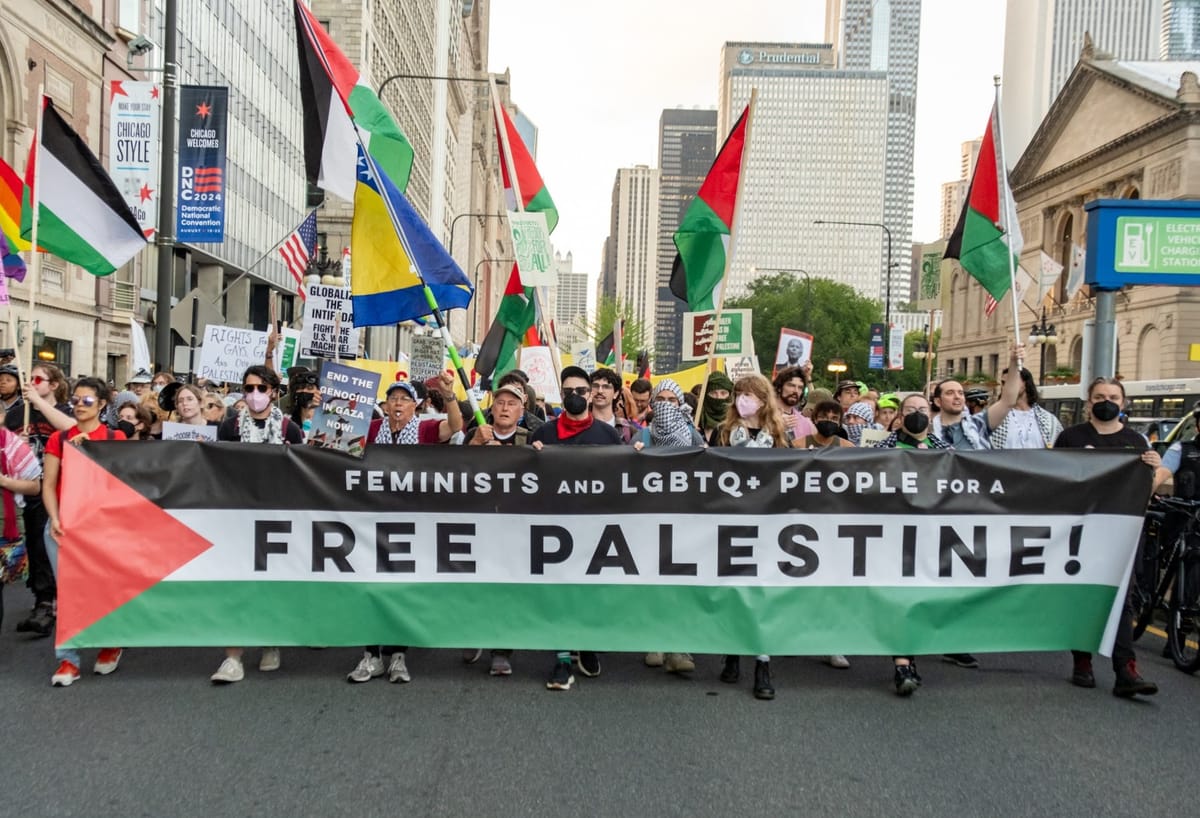
After a week of pageantry, celebrity cameos, and mass protests, the 2024 Democratic Convention has come to a close. In a speech that has been celebrated by some, and criticized by others, Vice President Kamala Harris stated, “President Biden and I are working to end this war such that Israel is secure, the hostages are released, the suffering in Gaza ends, and the Palestinian people can realize their right to dignity, security, freedom, and self-determination.” Talking points about “working to end” a genocidal campaign sustained by weapons the Biden administration continues to provide have been criticized by many, including U.S. Representative Ilhan Omar. As Harris prepared to take the stage Thursday night, I was among the thousands of protesters marching for Gaza outside. We marched toward the gates that had been erected around the United Center, where the DNC was being held. On the other side of those gates, Uncommitted delegates staged a 24-hour-long sit-in outside the convention center, demanding that a Palestinian speaker be allowed to address the public from the DNC’s main stage. The Democratic Party, unsurprisingly, refused this request. Amid the onslaught of editorials about Harris’ speech, and the overall spectacle of this convention, I am most interested in hearing from Palestinian organizers. Eman Abdelhadi, a Palestinian author and organizer, and Leena, an organizer with the Palestinian Feminist Collective, both spoke at a protest called “Bodies Outside of Unjust Laws” on the eve of the convention. In this interview, they share their impressions of this week of protest and politicking and talk about where the Palestine Solidarity Movement should go from here.
This interview has been lightly edited for clarity.
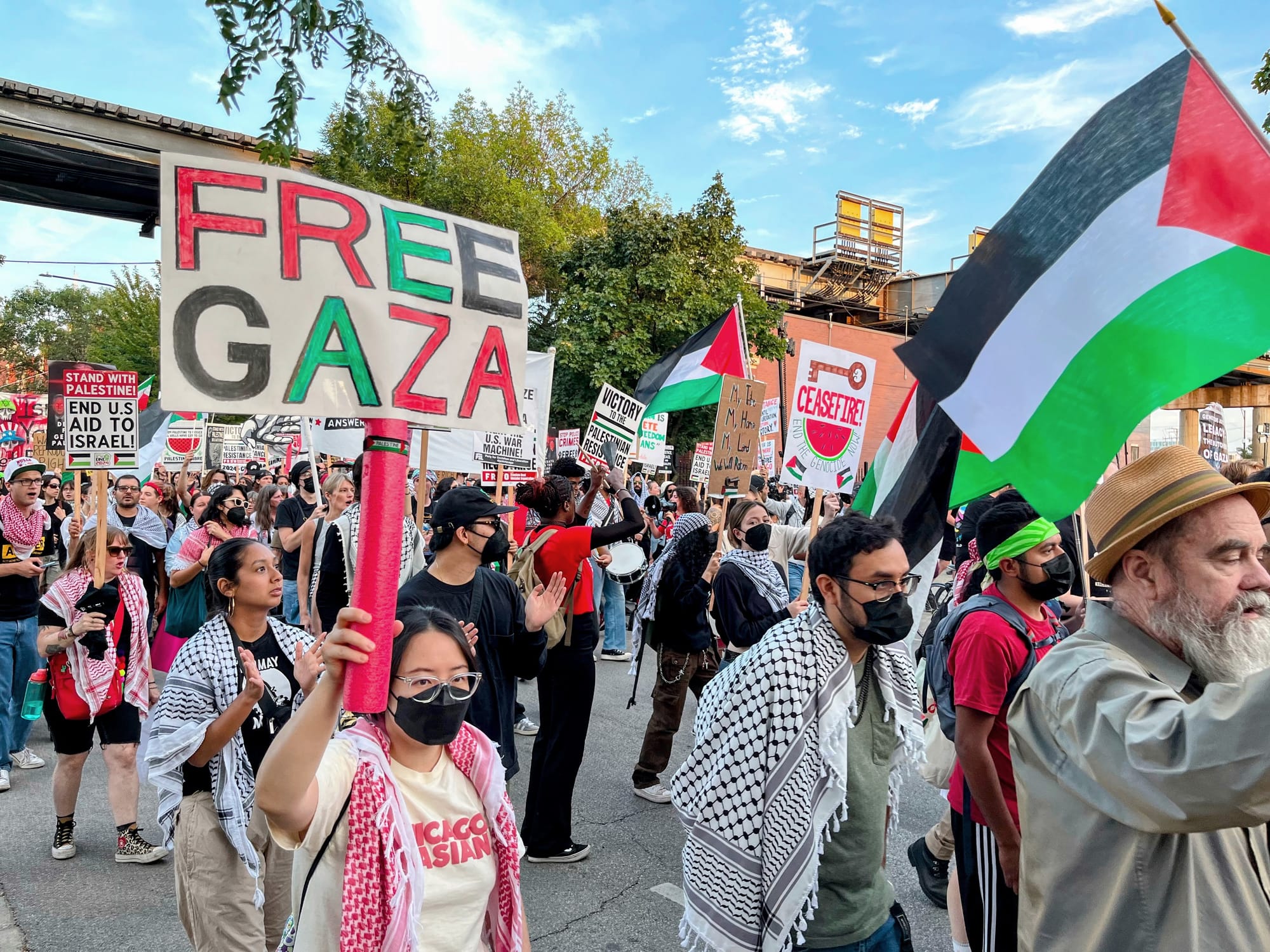
Kelly Hayes: Can you tell us a bit about yourselves, your work, and your participation in this week of protest?
Eman Abdelhadi: I am a professor, organizer, and writer based in Chicago. My participation this week has been threefold, really. I have been participating in the marches and protests in Chicago, answering questions from the press about the marches and our goals, and I've also been doing a little bit of writing and coverage of the Uncommitted movement for In These Times.
Leena: I’m a proud Southsider who hails from the southwest side of Chicago. I am the new executive director of First Defense Legal Aid, and I am also a founding member of the Palestinian Feminist Collective. Recently, I have been focused on trying to push forward a clear agenda, making connections around reproductive justice and reproductive genocide at this moment.
What I've found over the years since the destruction and intentional undermining of a lot of our grassroots community spaces across Chicago is that one’s political home is often in the relationships that we hold with each other. In the trust that we build. I think many times, like this week, I am an embodied community weaver, weaving connections and intersections across communities. I am connected to many different groups and I'm supporting them in a number of ways, including building bridges.
Kelly: The news cycle this week has been dominated by the pageantry and stagecraft of the Democratic National Convention. Amid the exaltations and critiques of various democratic speakers, we have also seen new waves of horrific imagery emerge from Gaza. Can you speak to the dissonance between the celebratory energy around the DNC and the heartbreaking images of children whose bodies have been shattered, burnt, and buried by bombs and munitions that the Biden administration has provided?
Eman: It's just horrifying, but it's really a microcosm. This administration does not want us to pay attention to the horrors that are coming out of Gaza. I think the air of festivity around the Democratic National Convention reflects that reality. That festivity has only been possible due to the repression of voices within and outside the Democratic Party that have been calling attention to the genocide that this party has funded and armed and politically supported for the last 11 months. The air of festivity, the pageantry, it's not coincidental. It's produced in part, in this moment of deep despair, to pull us into the joy and hope of a new presidential ticket. That hope and joy are intended to hide the kind of atrocities that this party has participated in. I think seeing the festivity of the DNC alongside genocidal violence on our phones every day really drives home the horror of this moment, but also the horror of the US political system and the way that it functions.
Leena: Everything Eman shared deeply resonates. My partner, my husband, and his family are originally from Gaza City. Gaza City was the only coastal city that was not occupied by Israel in 1948. It still remains today. In fact, one of the first places the Israelis bombed and looted was the municipality building of Gaza City, which holds some of the oldest archives and genealogies in Palestinian history, even human history. Jehad Abusalim from Gaza discusses how Israel has destroyed most, if not all, universities, cultural centers, archives, and institutions that affirm our histories, presence, and genealogies on this land. The people of Gaza are known as a prideful, dignified people, a people who resist, and I think in so many ways that has always been a thorn in the settler colonial project of Israel. They have tried, for more than 75 years now, to systematically destroy and undermine that pride and dignity in the Palestinian people, and in people across the region, in order to have us submit, as does any colonial project.
When I see the air of celebration, knowing that at least 40 members of my partner's family have been killed, sections of his family, three generations, completely gone, some of them to only have a child the same age as my first son survive, it reminds me that this too is a settler colonial state and a settler project and people who are participating in that settler project, even if they did not come here originally as settlers, it's only natural for them to then go ahead and celebrate in that way because Israel's ongoing genocide is part and parcel of the US's war on the region. This is not only Israel's war, this is the United States’ war.
Secondly, as someone who is a child of Chicago and a child of movement, parents who were longtime organizers in Chicago, whose mother was a delegate for Jesse Jackson when he was on the ticket, it's a reminder of the degree to which the Democratic Party has moved to the right. To imagine that there was a time when Jesse had a campaign in which Palestine was central to his platform, in which he spoke about Palestine openly and directly, and that within the convention, there were tents set up by Palestinian and Palestinian solidarity organizers to replicate the tents that were set up in the Nakba in 1948. Thinking about that legacy and that history here in Chicago and the fact that the Democratic Party has now moved so far to the right, and we're supposed to accept the use of our resources to continue to aid and abet a genocide while we live in a city in which all swaths of neighborhoods have lost their schools and don't have basic clean water because our pipes are lead, and don't have access to clean, fresh, healthy food. Where we have an epidemic of Black maternal death because of a lack of access to healthcare and a systemically racist healthcare system. It's disorienting. It's sickening, but it's not surprising, sadly, because we know all too well that the United States is the primary settler colonial state and empire on the global stage, trying to hold on while the world shifts towards a multipolar world.
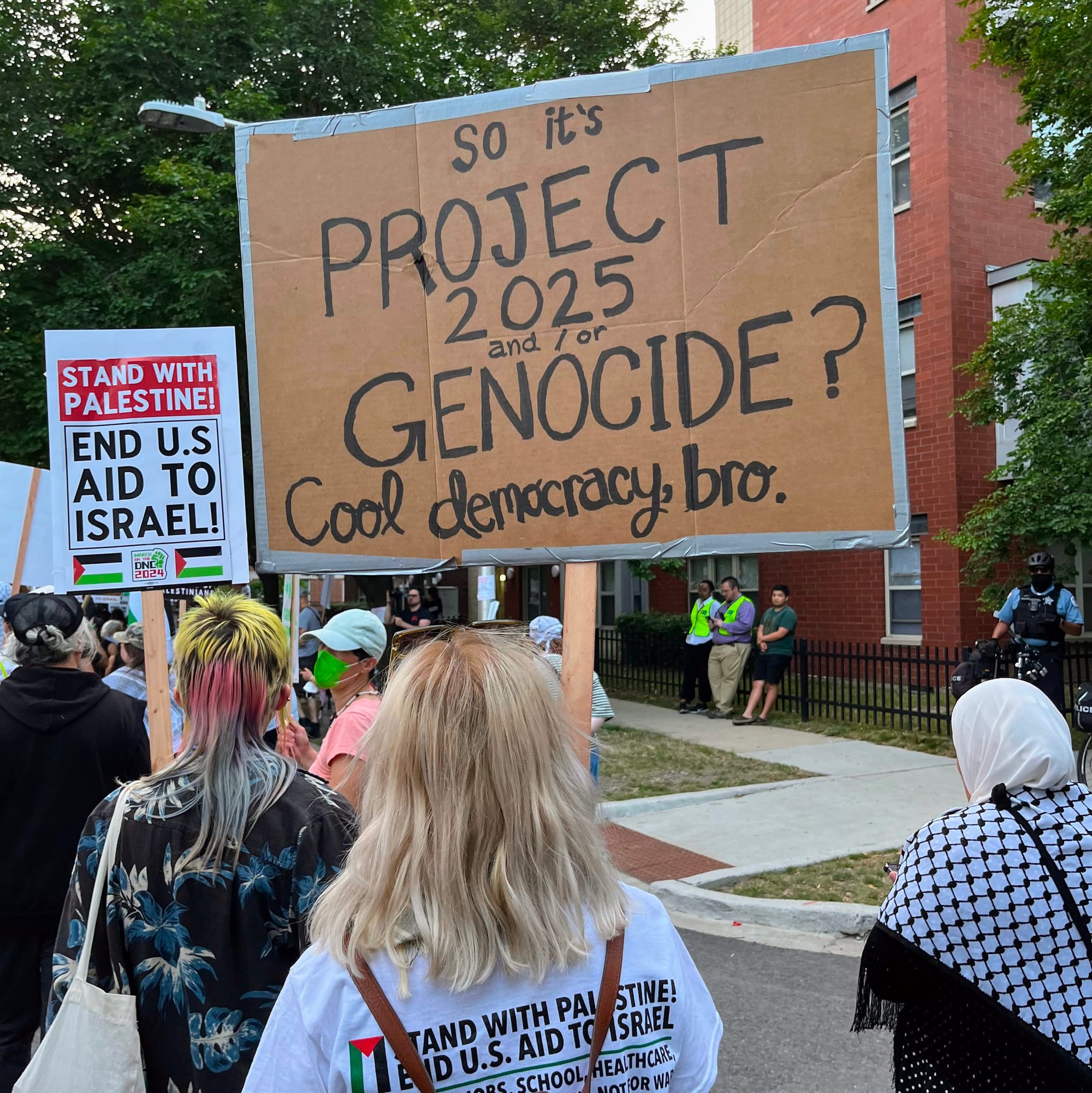
Kelly: Some people in the Palestine Solidarity movement are opposed to making any demands of Harris, opting instead to condemn her in absolute terms for her role in this genocide. Some people have taken a different approach declaring that their votes are contingent upon Harris committing to policies and demands that would end the genocide Israel is waging, such as an arms embargo. How are the two of you choosing to engage with the Harris campaign, and have the events that the DNC this week impacted your view of the situation?
Eman: First of all, I want to say that I don't think votes in the US in 2024 are a moral endorsement. I think they're a strategic act. In an immoral system, I think the idea that our votes are moral endorsements is nonsensical. Ultimately, I don't think we will have full liberation unless we have a revolutionary change in the system, but we are not there yet, and so the question becomes, how do we move forward? How do we try to save lives? For me, what seemed most strategic was to make votes for Harris contingent on policy change. Now that's kind of a moot point because she hasn't offered any policy change. She and her campaign and her supporters have made it clear that they are not interested in our votes or our support and they think they can win without us.
I think the question for all of us in the US, here in the heart of empire... I think we need to have multiple strategies that maximize different people's positions in the movement. Some people who are very committed to Palestinian liberation have relationships with the Democratic Party, usually on the local level or state level, and want to leverage their position as Democrats, as career Democrats, or as lifelong voters for the party. I think that's fair. I think people should do that if that's within their realm. I think it's also important to be building power outside of this party, on the street, to be building the power of disruption. Ultimately, that's what we were very successful at over the last 11 months. The problem is that I think on the left, we don't yet have the means to translate some of our street power into policy change. And I think that's what we're seeing in part right now.
Harris hasn't earned my vote. I think that this is a red-line issue for me. This is a bottom-line issue for me. I think, especially not living in a swing state, I feel comfortable registering a protest vote against her through a third party candidate. I'm not sure which one. But I also think the threat of Trump is real. We don't know what he would do. He has not been a friend to the Palestinian people. And most importantly, I think that another Trump presidency means that we, on the ground, who should be building power toward Palestinian liberation, will be in a really reactionary position and will be putting out fires. Because if his last presidency is any indication, he'll probably be destroying a lot of material wins that progressives have worked really hard to institute.
So cutting federal budgets to the few social safety net programs we already have, attacking queer folks, attacking reproductive justice, etc. Not that the Democrats have not done a great job of protecting any of that stuff, but I think that the level of attack that these things would be under would worsen under Trump. So I think we have to be really strategic in this moment. I think this is the moment to think really hard about what comes next. Whatever we're doing, where does it lead? Because I don't think we can afford a posturing towards purity at this moment, particularly because we live here. We live in the system. We pay taxes under the system. We purchase goods that are deeply complicit in the occupation and the genocide. We go to schools that invest in the genocide.
So I think telling ourselves, "Oh, I'm morally pure because I'm not voting or I'm not engaging in the political system," or thinking, "Oh, if I go to a protest, then I'm shutting it down, and I'm not a part of this," I think it's delusional, and it's an abdication of responsibility. I think our primary responsibility is to build power and to think strategically about how to save as many people as we can. So I think that has to be the first line of the conversation. And I'm open to being told that one strategy is better than the other. But I'm not in a position right now, having watched 200,000 people get killed by this war directly and indirectly, to just eschew the question of strategy.
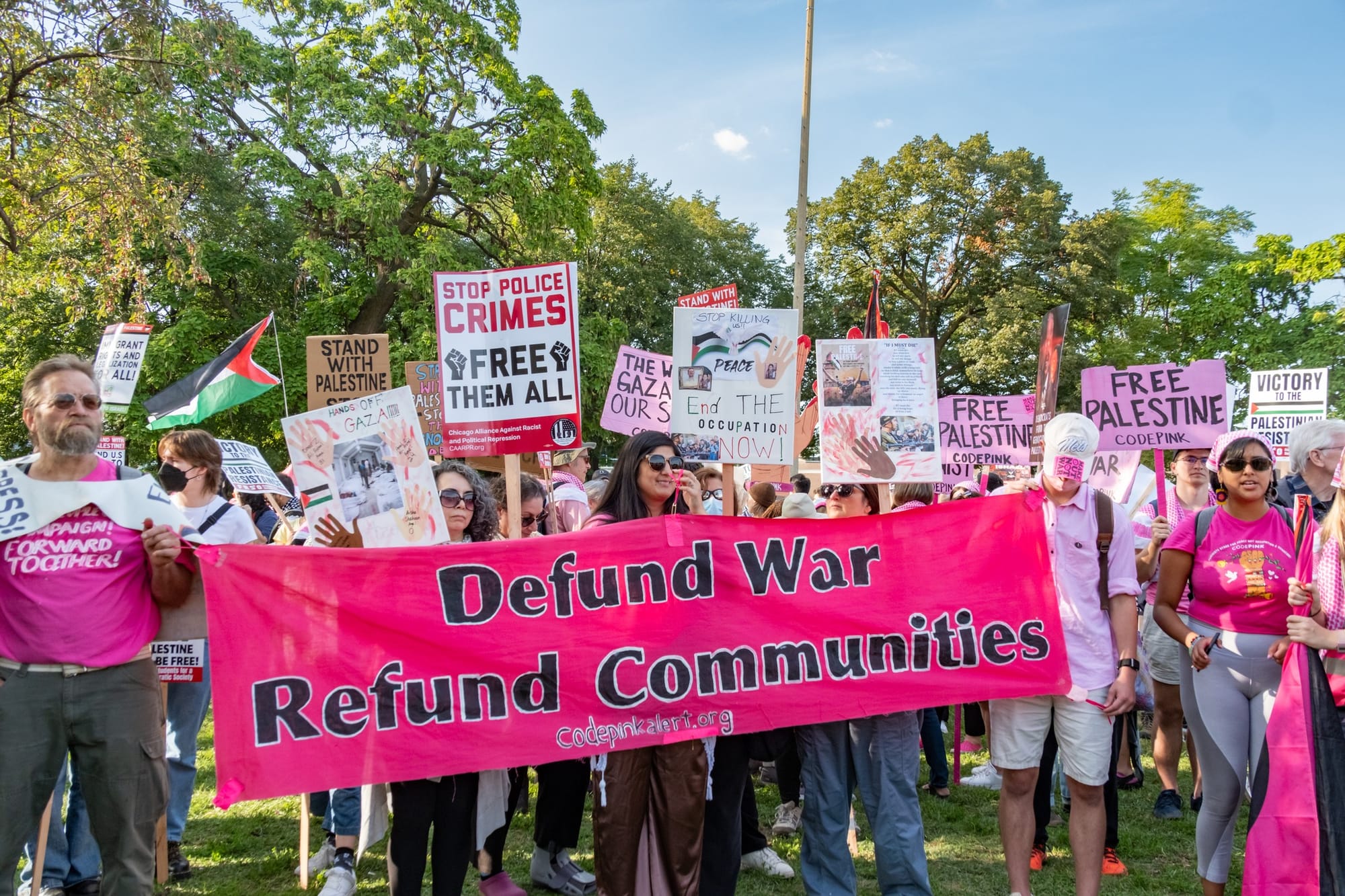
Leena: A lot of what Eman shared earlier on deeply resonates. I think the onus of this question really is for the Democratic Party. What have they done to provide viable new leadership and a vision that could be an alternative to the very real threat of right-wing forces further consolidating in this moment? We are seeing antisemitic right-wing forces consolidating further. It's not the beginning. We saw this with the Evangelical Christian Zionists, with Zionists, and we're seeing it in the battles in our schools and universities, where the same people who have been challenging and undermining CRT, and basic human rights for trans folks and disabled people, are aligning with the Zionists against anything that could be remotely seen as humane or life-affirming as it relates to the Palestinians as actual people and not "barbaric savages" who need saving through foreign intervention or occupation.
And so that very real threat is confounding when the Democratic Party is not providing a viable alternative. If they had been savvy, they would have been preparing an alternative candidate to the Biden-Harris administration. Harris is complicit in this genocide. She is part of the administration that has been unwavering in its green-lighting of it. I agree with Eman in that we need a spectrum of tactics and strategies. And historically, the Palestinian liberation and solidarity movement always understood that and still understands that. And that's how and why we had people as delegates for Jesse Jackson, for example, when he ran for office, or we had people in Harold Washington's administration. The Palestinian vote on the southwest side of Chicago was actually critical for the Washington administration.
We had something similar play out as well in Brandon Johnson's election, where even in the face of Brandon Johnson making harmful statements on Palestine – when he endorsed laws and policies that would criminalize free speech as it relates to Palestine – we were able to have a conversation with him from a place of mutuality, where he agreed and understood that it was important to repair the harm done. Our community was out in the streets canvassing, not just among the Arab community within the city of Chicago, but across the southwest side, northwest side, Latinx communities, other migrant communities, and beyond. And I know that because I was on the ground.
And so all of that to say, I think the question is pitting internal forces in our community against each other when they're not actually against each other. They’re working together and we are building power. We recognize that we need a whole spectrum of tactics and strategies. Different people and different groups have important roles to play, and all of it is towards the broader struggle. As a dear friend, organizer, and teacher says, “It’s all the work, from the care work, to the educating, to the emergency mobilizations.” And that our role as organizers is that we don't have the luxury to say, "Oh, well, I don't want to deal with that person," or, "I don't want to educate that person."
No, our role as organizers is that we have a duty to meet people where they're at and build bridges. And I see that happening across the board in Chicago and beyond. Now, I think Eman is absolutely right. What we've seen actually transpire in the DNC is very disheartening, because we're seeing that delegates had to have a sit-in just to have someone speak. And so I think where the movement is at and where we're at is demanding an arms embargo is no longer pie in the sky. I actually think that that is the new floor. Ceasefire is no longer the floor; that's a given. We have people across ideological spectrums demanding that. An arms embargo is the floor. And if the Harris administration cannot deliver and commit to that, then I think essentially they're choosing their fate. They've done so repeatedly in the choices they've made up until this point. And I think the arrogance of being part of the broader 1% of those in power and the elites is that they think they're going to somehow overcome, and they're not.
The question is, will we allow fractures to happen when our community is scapegoated and thrown under the bus when or if the Democrats lose? We know that’s driven by anti-Palestinian racism and Zionism, so when and if that time comes, we as people of conscience need to rise above and continue to build those bridges across our communities and struggles because it’s principled and right. It’s what all of our peoples need for transformative change and justice.
And lastly, I think as with any tactic, electoral politics is simply one tool among many. And we need all the tools at our disposal. And we have a duty, as Eman said, as people in the belly of the beast, to translate our demands into material change for people on the ground to no longer suffer. It's unacceptable that we're almost a year in, and it's become normalized to have terms like "wounded child, no surviving family members." That is not only a broader societal, intentional, disabling project, but it's also transforming the world that we live in. And it's normalizing a type of brutality and violence that we have not seen in the contemporary moment. So we're seeing in conflicts across the world further erosion of the supposed rule of law and more gratuitous acts of systemic brutality since the genocide.
I think I felt more like where Eman is at in 2020 and before, and now I'm in a different place. The period of organizing that we're seeing in many ways couldn't be possible without the uprisings that were happening in 2020 around racial justice. Our grassroots community building and organizing spaces and organizations have been systematically undermined, especially in the last 10 to 15 years, through what I call ethnic cleansing. Some of it is gentrification, some of it is intentional, but it's combined. And so what I think we really need are spaces that invest in and see political education as a political project in its own right and in young, emerging leadership holistically – kind of like creating liberation zones.
So much oxygen is sucked out of the room around electoral politics, and so much energy and resources get put into it as well. Yes, it's a tool that we use. I've always understood that, but I no longer support us putting so much energy and resources into a tactic that hasn't translated into real material change for our people, at least on the national level.
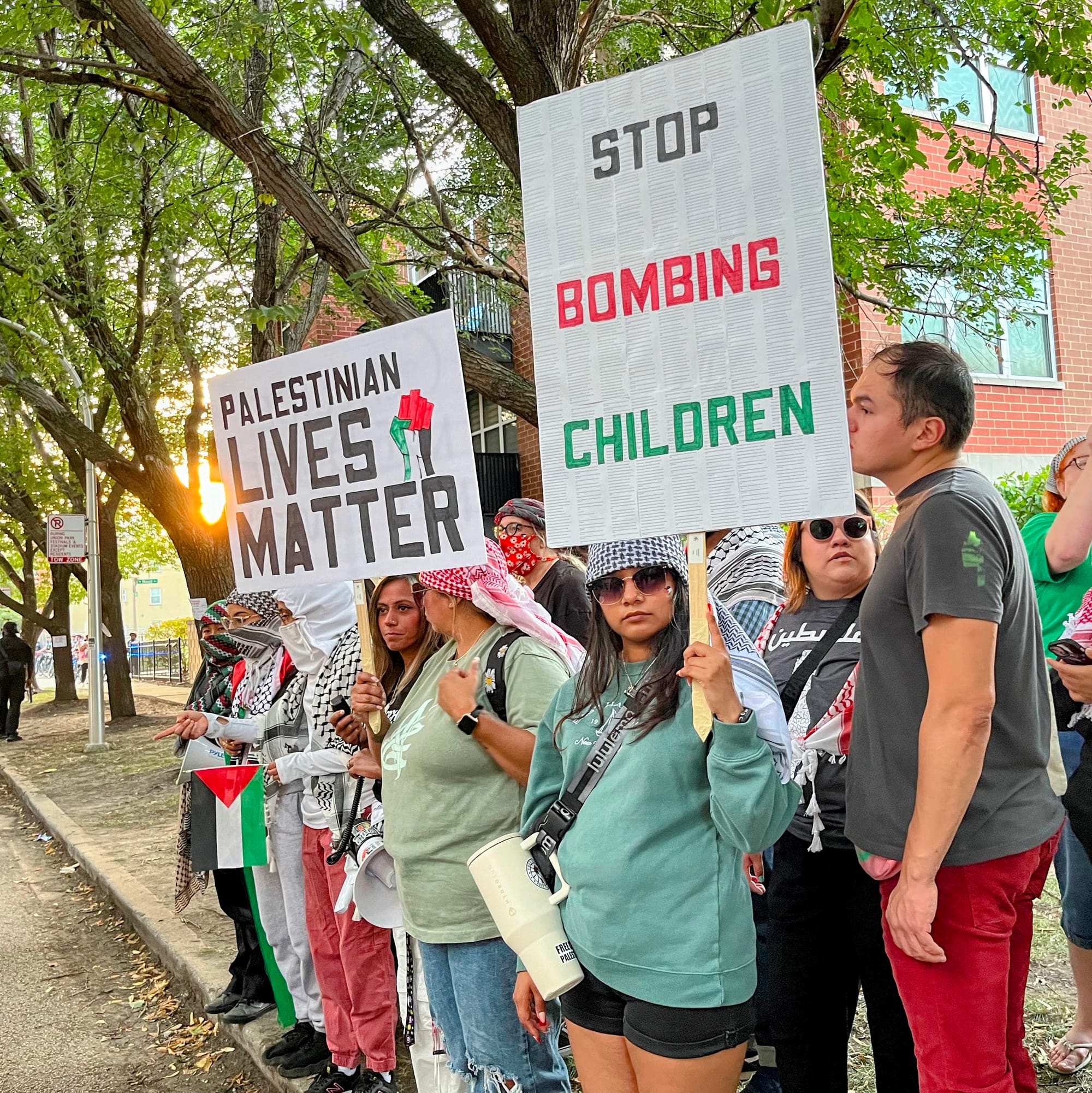
Kelly: This has been a steady week of protest as people have challenged the Democratic Party for its role in the ongoing genocide Israel is waging. Can you talk about the most powerful moments you have experienced this week?
Eman: You know, there was a moment Wednesday when I was marching by this group that was extremely energetic. And the chant leads were a Black man that I know from organizing circles, some younger Arab folks from Bridgeview, and some elders, including an auntie in a full thobe. And they were sort of switching off chant leads and everyone was jumping and chanting together. There was so much grief and rage but also joy in that solidarity. I don't think that any pageantry on the inside of the DNC, any sort of celebrity culture, or worship of the ruling class, matches the kind of solidarity that we've built with each other on the street. You could see it so clearly in that moment, with folks chanting and singing together, coming from such diverse lived experiences, from very different worlds, but sharing a sense of unity around their demands for justice.
Leena: That is beautiful, and I always feel like it undoes the knots in my heart when I see that. Sparks of inspiration, joy... it's hard to access joy while there's the ongoing genocide, but I think one of the things that's felt really inspiring to me is that the young people and the young organizers, many of whom are directly impacted themselves, seeing that they are not letting up and will make it uncomfortable for the elected officials, including Harris herself at all hours of the night and day.
The other thing has been Dissenters, which is a really incredible organization that has had this alternative to the DNC space. It's a political education space. So seeing the intentionality, seeing the solidarity, seeing the thoughtful study and reflection of the last 11 months of organizing, but also how energized and committed the students are to learn the lessons and think about the immediate response of now, but the long-term as they return to campuses in the fall because that's a student-based organization. The tireless efforts of all the organizers that made this march possible did not stop for one moment, and they have such a profound commitment to our cause and people.
I'm often in what we call the buggy brigade, the Mama's Brigade, in the far back with the people pushing strollers and also folks using wheelchairs. And we're just all together looking out for one another. We are seeing multiple layers of policing and law enforcement on the local and federal level, and yet who's in the streets? Our parents, our grandmas, our babies, and we're all supporting and taking care of one another and making sure everyone is safe and well. And lastly, the marches have been through the West Side of Chicago where the United Center is located, and some of the community members from the neighborhood, including children, have been coming out with signs for “Free Palestine” and also freeing their neighborhoods or waving flags. And it's a reminder that the deeper community building and solidarity building needs to happen across our communities and struggles. And that, ultimately, our liberation is bound to all people's liberation, but especially Black liberation in this country.
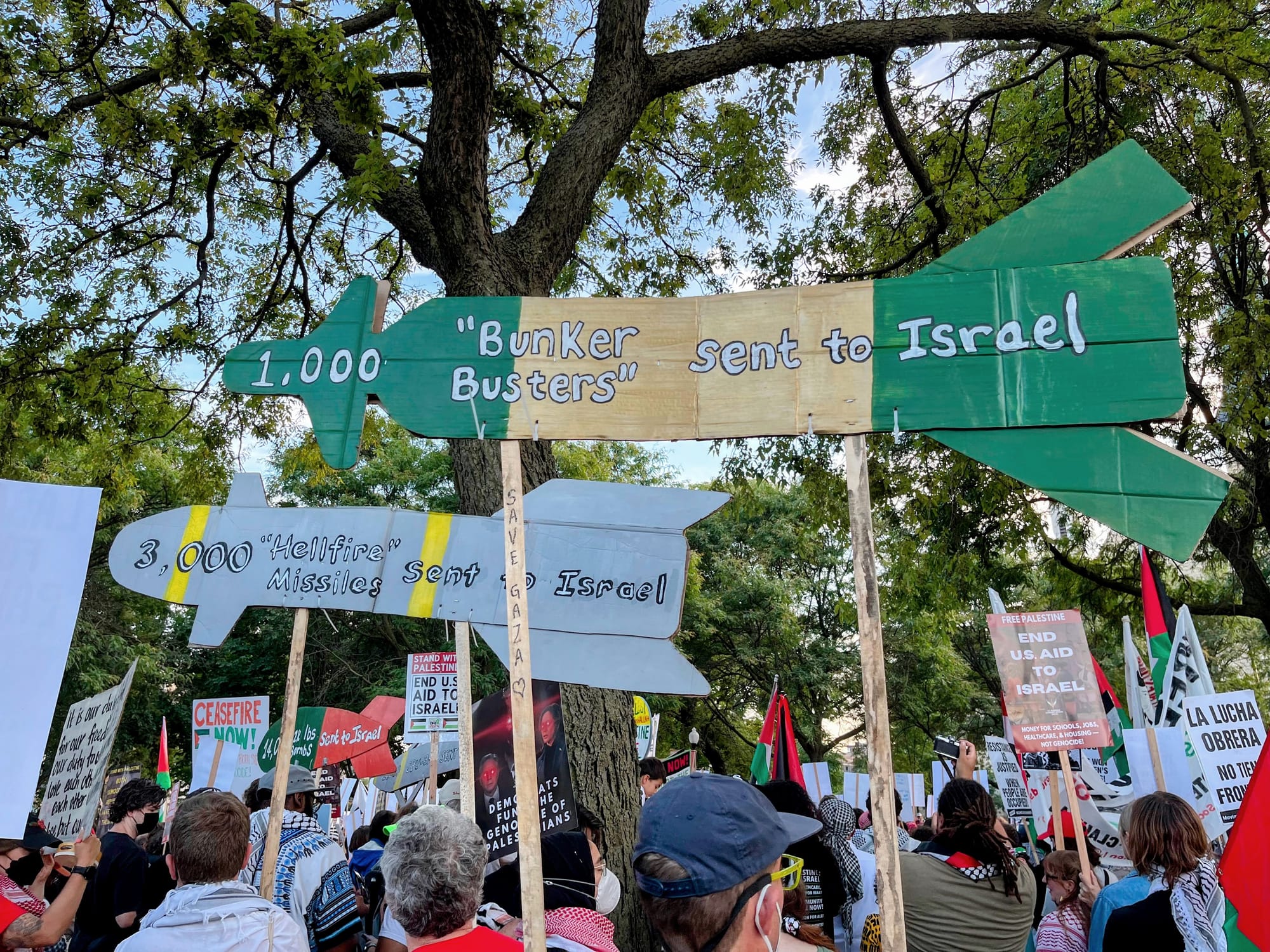
Kelly: Eman, you were targeted by Harris supporters on Twitter for writing a post that said Chicago was “ready” for Harris. It was completely clear that you were talking about the DNC protests, but some people claimed that you were threatening the vice president, and they contacted the FBI. Can you talk about the hostility some Harris supporters have shown towards Palestinian activists? How do you feel about the fact that some people are framing this as a rift between Black and Palestinian activists?
Eman: With that tweet, it became a huge sort of harassment campaign where people posted the screenshot over and over. People were very gleefully claiming that they had called the FBI. There was a sense that I was the enemy, but I think there were also accusations, and it was a mix of Harris supporters who did this. I think that this sort of intimidation is in line with the way the Democratic Party treats various voter blocks of people of color, saying, Get in line. This is the best that you're going to get, so don't you dare ask for anything better. And this kind of bullying is tied to how they demand votes. It was weird to have other people of color enact that. I think that some of the conversations that I ended up having with people were productive. There were conversations with people saying they were going to call the FBI, but some folks brought up the idea that it was anti-Black to protest Harris.
I think I responded to that by talking about how we've been protesting Biden, how this makes sense given that she's in power. But I think it speaks to the kind of limits of [identity-based] representation in politics, which, in reality, a lot of people are deeply invested in. I think that there's been a purposeful attempt to frame this as a Black versus Palestinian issue when, in reality, both communities are diverse and have a mix of opinions. A lot of the accounts that came to my defense were Black folks who were sort of horrified and drew on Black history and the Black Power movement to say, This is not how we treat other people of color. The FBI is not our friend. This party doesn't deserve this kind of loyalty, even if it's willing to have a Black person at the top of it.
So I think that kind of became an intra-community conversation. But I think it's important for Palestinians, especially in the US, to think about the broader context as well. There's definitely a sowing of discord that's happening, but I think it's also important to think about why people feel so desperate to feel some joy and hope about the future. A lot of people feel very scared of Trump and the effect that Trump would have on working-class people of color here in the US, and whether we would lose some of the very few safety nets that we have and that would disproportionately affect Black communities. So I think we need to attend to those concerns. I don't think we can just dismiss those concerns, especially given that one of the arguments that's popped up in this discourse is that Arab people have not reciprocated this solidarity.
Now, I think that there's this way that social movements are presented as just a movement by X group. People talk about the pro-Palestinian movement as if it's all Palestinians, when in reality, if you're marching in any given pro-Palestinian rally, Palestinians tend to be the minority in the rally. So I think that there's a tendency to frame movements in a way that erases their coalitional nature. All the Palestinians in my social circles were protesting in 2020 and are very committed to Black liberation and see Black liberation as fundamental. And so I think there's a way that that solidarity doesn't get highlighted as much as it should. But also, I think there's very real anti-Black racism within the Arab community that we've been working to address from within the community. We still have a long way to go. I will also say that marching these last few days helped remind me that the internet is not real life. Because as I was marching, we had the same Black comrades. I found myself marching behind a chant lead that I used to march behind in 2020 regularly. We marched past Black communities and Black neighborhoods, and people were cheering for us and waving and, in some cases, even joining the marches. So I don't know how much this discourse actually filters into day-to-day life, but I think ultimately it's really important for us not to shame Black folks who feel that a vote for Harris is a necessary survival move given the threat of Trump.
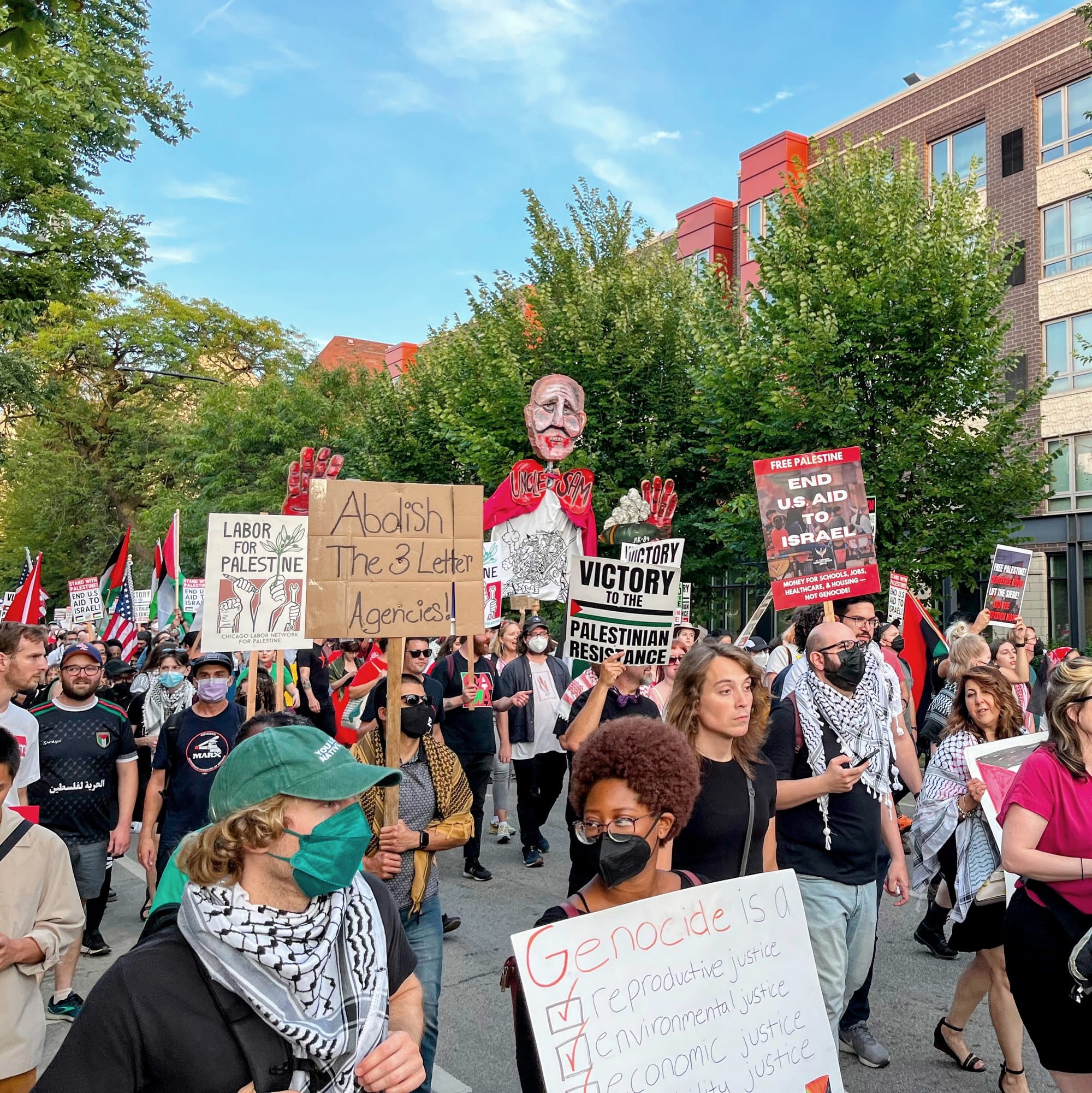
Kelly: Now that the convention is coming to a close, where do you think people who are determined to end the genocide should go from here in terms of challenging Harris or pursuing other avenues of persistence?
Eman: I think we should keep on building our power. As Leena said, I think the electoral arena is one area, but I don't think that that's where most of our power has been built. To borrow Jane McAlevey's words, I think we need to go from a strategy of mobilizing to organizing. I think we need to build strong communities and build power within our communities such that we see each other at protests, but we also see each other in a more sustained fashion, and we start to use that power to address the institutions that are within our sphere of influence. So organizing within our workplaces, organizing within our identity-based communities, organizing within our schools or universities, wherever is accessible to us.
And, of course, converging on the street in protests in a disruption of the status quo to repeatedly make the statement that we can't let business as usual go on while this country funds arms of genocide. I don't think Harris is going to change her platform. I don't know if we should engage with her any further. I think she should continue to be protested, just like any other member of this administration. And we have to keep building our power and the power of our movement.
Leena: I completely agree with Eman. I think that none of us imagined that we would be almost a year into this, and it's unbearable. And I think a lot of us have to be in some form of cognitive dissonance in order to function, which is a minimal sacrifice as compared to the sacrifices our people are making on the ground. I think as Eman said, we all have a duty and a role and a part to play. At a minimum, we cannot let up our efforts. We must continue to alchemize our pain into action for a ceasefire and an immediate arms embargo on Israel. We have to keep building community, trust, and organizations.
I think the deeper work of consciousness building and/or political education across sectors of society is so needed, especially from the bottom up, centering the working class as much as we can in that development and working to create the contradictions here within the US empire.
I think we need to be doing the immediate response work and disrupting, as Eman said, while simultaneously doing the long-term building and envisioning, for lack of a better term, a new third-world project that centers on ending the genocide now but also weaves together our broader liberation struggles be it with our Indigenous siblings here on Turtle Island, or with our Black siblings here on Turtle Island and beyond, because there's no liberation for any of us without our joint struggles and we have so much more that ties us and connects us than our struggle. We have love, we have life, we have our appreciation and our commitment to the land itself. So I think what we need to go forward is to think about that dynamic tension between the immediate response and what it looks like to build in the long term and how we do so through investing in and creating young leadership, youth-driven organizing, building deeper solidarities through both relationships and trust and also through consciousness building and political education. And lastly, building our alternatives to these death-making institutions that are life-affirming, cultivating lasting institutions that are centered in our values and our vision for a new world.
Usually, until this point, I've said that the midst of genocide is not the time to be visioning because we need to put an end to the suffering and the bloodshed now, yesterday, immediately. But we are almost a year into this, and it's clear that we need to continue to build on what already exists to reach that goal of liberation. Lastly, liberation is not a pinnacle. We will have a lot of work to do once we get there.
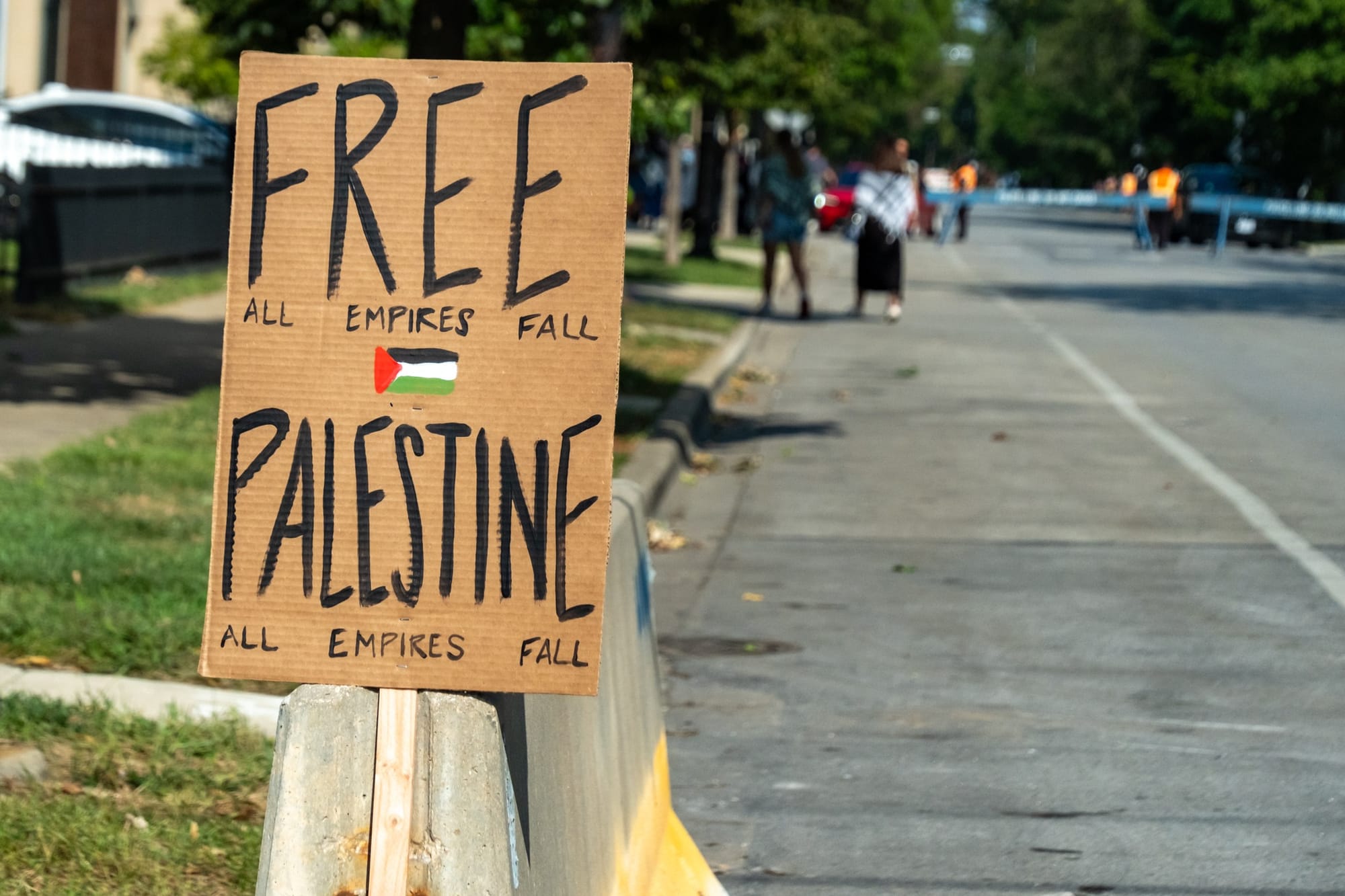
Organizing My Thoughts is a reader-supported newsletter. If you appreciate my work, please consider becoming a free or paid subscriber today. There are no paywalls for the essays, reports, interviews, and excerpts published here. However, I could not do this work without the support of readers like you, so if you are able to contribute financially, I would greatly appreciate your help.




